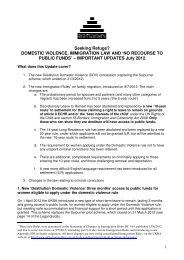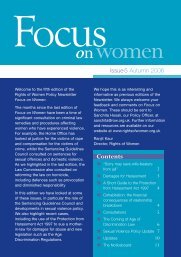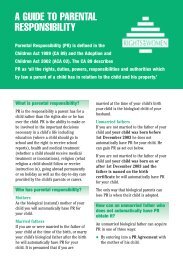Seeking Refuge? - Rights of Women
Seeking Refuge? - Rights of Women
Seeking Refuge? - Rights of Women
Create successful ePaper yourself
Turn your PDF publications into a flip-book with our unique Google optimized e-Paper software.
<strong>Women</strong> may experience violence for a number or<br />
reasons. Sometimes women may experience<br />
violence just because they are women. Here are<br />
some examples <strong>of</strong> different kinds <strong>of</strong> violence that<br />
particularly affect women:<br />
• Domestic violence and abuse: this is violence that<br />
is carried out by a woman’s family, including her<br />
parents, her husband or her children.<br />
• Sexual violence: this may involve forcing or<br />
pressurising a woman to have sex with<br />
someone she does not want to, or harming her<br />
sexually. Sexual violence occurs whenever a<br />
woman does not agree to the sexual behaviour,<br />
whether or not she knows the person<br />
responsible for it.<br />
• Punishment for relationships outside marriage.<br />
For example, being punished for having sex<br />
with someone you are not married to.<br />
• Punishment for being a lesbian or bisexual. A<br />
lesbian is a woman who wants to be in a<br />
relationship with another woman (rather than a<br />
man) while a bisexual woman is a woman who<br />
can be in a relationship with either a man or a<br />
woman (rather than only with men or only with<br />
women).<br />
• Being forced into a marriage that you do not<br />
agree with or have not chosen.<br />
• Not being allowed to end your marriage by<br />
divorce.<br />
• Violence against you because others think that<br />
something that you have done or not done has<br />
affected your family’s honour (this is <strong>of</strong>ten<br />
called “honour-based violence”).<br />
• Violence related to your dowry. For example,<br />
where others think that what is <strong>of</strong>fered as a<br />
dowry is not enough, or where a woman is<br />
harmed because she wants to take back her<br />
dowry when her marriage has ended.<br />
• Forcing a woman to have an abortion when<br />
she does not want to, or preventing her from<br />
having other children when she does not agree<br />
to this.<br />
• Forcing a woman into prostitution, to have sex<br />
with men when she does not want to. A<br />
woman could be forced into prostitution in her<br />
own country or she could be taken to another<br />
country. Where a woman is taken to another<br />
country or moved about within her own<br />
country so that she can be forced into<br />
prostitution, it is called trafficking.<br />
• Female genital mutilation (FGM), where a<br />
woman’s genitalia are altered or interfered with<br />
for a reason that is not a medical reason.<br />
The UK Border Agency has two Asylum Policy<br />
Instructions which should be followed by caseowners<br />
when they deal with a woman’s claim for<br />
asylum:<br />
• Gender Issues in the Asylum Claim; and<br />
• Victims <strong>of</strong> Trafficking.<br />
The guidelines contain information about the<br />
forms <strong>of</strong> persecution women may face and how<br />
the <strong>Refuge</strong>e Convention reasons should be<br />
interpreted to include these types <strong>of</strong> persecution.<br />
You can download the guidelines from<br />
the UK Border Agency website here:<br />
www.ind.home<strong>of</strong>fice.gov.uk/policyandla<br />
w/guidance/<br />
Information for women asylum-seekers<br />
about the guidelines is also available<br />
from Asylum Aid (an independent<br />
charity) and can be downloaded here:<br />
www.asylumaid.org.uk<br />
Is there any other international<br />
law that can help me make a<br />
claim under the <strong>Refuge</strong>e<br />
Convention?<br />
International human rights law aims to secure<br />
gender equality and respond to violence against<br />
women. This means that your legal representative,<br />
or you, if you are representing yourself, can use<br />
international law when arguing that you should<br />
be given protection in the UK. In the case <strong>of</strong><br />
Fornah 5 , the House <strong>of</strong> Lords (which was the<br />
highest court in the UK until 1 October 2009)<br />
stated that the UK, which is a signatory to a<br />
number <strong>of</strong> important human rights treaties, must<br />
interpret and apply the <strong>Refuge</strong>e Convention in a<br />
way which is compatible with these treaties.<br />
4 The Qualification Regulations as interpreted following the House <strong>of</strong> Lords’ judgement in: Home Department (Respondent) v. K<br />
(FC) (Appellant) Fornah (FC) (Appellant) v. Secretary <strong>of</strong> State for the Home Department (Respondent) [2006] UKHL 46. For further<br />
information see <strong>Rights</strong> <strong>of</strong> <strong>Women</strong>’s’ Focus on <strong>Women</strong> Winter 2006 which can be downloaded from: www.rights<strong>of</strong>women.org.uk<br />
5<br />
Fornah v Secretary <strong>of</strong> State <strong>of</strong> the Home Department [2005] UKHL 46.<br />
15
















